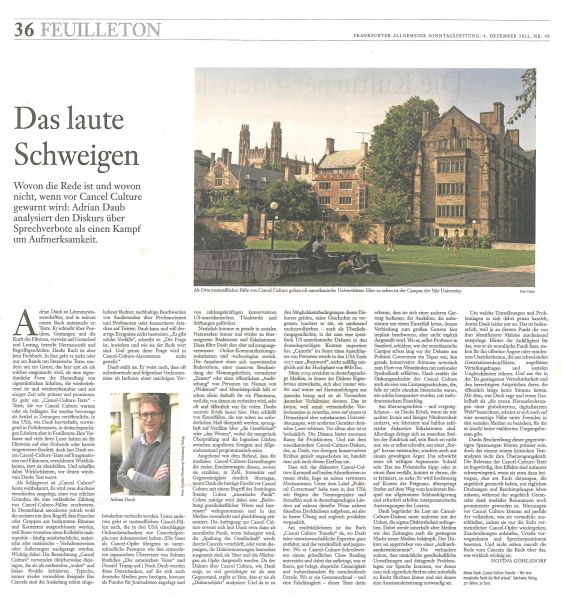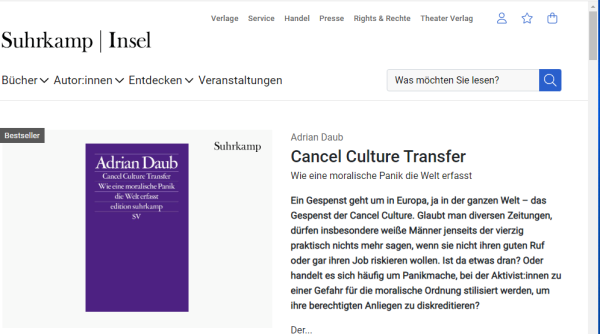Adrian Daub
Adrian Daub and the Cancel Culture Transfer
The German writer Adrian Daub lives and works in the U.S. At this time, he serves as Professor for Comparative Literature at Stanford University in California. His latest book Cancel Culture Transfer came out in November of this year and has not yet received an English translation, so I have not seen it. His position at Stanford suggests aptitude on this subject, so I expect a translation soon.
Among other things, Daub specializes in the power of fictions, "Fiktiven," which sounds like a term that reaches beyond the realm of literature, inasmuch as it straddles the gray area between poetic license and an effort to influence a person's perception of reality.
The above article appeared in the Sunday edition of the Frankfurter Allgemeine newspaper on December 4th of this year, written by the German journalist Novina Göhlsdorf, who also writes for Die Zeit and Die Welt. Göhlsdorf does not review the book as much as she introduces her readers to it, and also recaps the salient issues in the Cancel-Culture controversy.
After reading Daub's book, Göhlsdorf believes that the American media has exaggerated the degree of the problem and the net-effect of Cancel-Culture. For this, she blames "zahlungskräftige konservativen Think-tanks und Stiften," wealthy conservative think-tanks and foundations. "Presumably," Daub writes, "there have been instances of people being cancelled. Speakers have been invited to speak on college campuses, and student protests have led the universities to rescind the invitation. They receive pressure from Woke 'Kollektivs' who find the speakers unacceptable in light of their racism or sexism." The real question, Daub asks, is how often does cancelling occur and whether the media should pay so much attention to it.
Daub concludes, says Göhlsdorf that the stories or instances of cancelling enter circulation in social media and undergo "übersteigerten Reaktionen and Eskalationenen," i.e. negative embellishing that contribute to the "Spaltung der Gesellschaft," the splitting in the fabric of the society, a common theme in Germany, as it is in America.
I would like to ask Daub and Göhlsdorf what evidence they need to persuade them that the Cancel-Culture presents a problem to the stability of a freedom-loving nation? The sheer number of events? A pattern of violent actions by cancellers? Disruption of campus activities at universities? Pressuring employers and landlords to dismiss the outliers? Just a cursory glance at the history of Antifa shows a violent pattern. Often the participants cover their faces so that right-wing groups won't cancel them:
- The 2017 protest at the University of California, Berkeley, against the appearance of Milo Yiannopoulos. Antifa protesters threw Molotov Cocktails and smashed windows, causing $100,000 in damage.
- The organizers of the 2017 Rose Festival in Portland, Oregon, had to cancel the parade after Antifa sent them a letter: "If Trump supporters and others who promote hateful rhetoric march, we will have two hundred or more people rush into the parade and drag and push those people out."
- In November, 2018, a mob threatened to break into the home of Fox News correspondent Tucker Carlson.
- Peter Beinert published "The Rise of the Violent Left" in The Atlantic magazine, November, 2017. Antifa, he says, "tries to publicly identify White Supremacists and get them fired from their jobs and evicted from the apartments."
- The Washington Post reported in September, 2017, that "Antifa tactics include 'no-performing', i.e. denying their targets the opportunity to speak out in public."
Although no one wants to use Medieval-sounding words like "apostasy," "excommunication," or "heresy," to describe the Cancel-Culture, it really just employs a modern term to describe a very old concept, namely the fear of opposing points of view gaining ground against religious fervor.
People need a philosophy--what the Germans call "ein Glauben." They need to believe in something--not just acceptance of scientific insights about the relative position of the sun to the Earth and the moon, or the nomenclature of human pathogens--not Medieval humors--but a faith in something emotional, close to the heart, that defies the strictures of empiricism.



